Andrea Batacchi’s path into coffee began like many fellow Italians – with the moka pot at home and accompanied by pastries at the café. But what started as a familiar routine grew into a deeper passion during his student years, when he began experimenting with a French press and discovering the range of flavours coffee could hold. That curiosity soon outgrew the kitchen counter and led him toward a professional career.
Today, Andrea manages everything coffee-related at TODOMODO in Florence, an independent bookshop and café that has embraced specialty coffee. From shaping the menu to brewing for regulars and tourists alike, he focuses on tailoring each cup to the needs of the guest – sometimes a quick espresso, other times a detailed conversation about origins and methods. His approach is rooted in care, openness, and a desire to make specialty coffee accessible without losing its complexity.
On the competition stage, Andrea has built an impressive resume: runner-up at the Italian Aeropress Championship in 2021, Italian Brewers Cup Champion in 2025, and a top-five finish at the World Brewers Cup that same year! For him, competitions are less about prestige and more about curiosity and growth – the same spirit that drives him daily behind the bar in Florence.
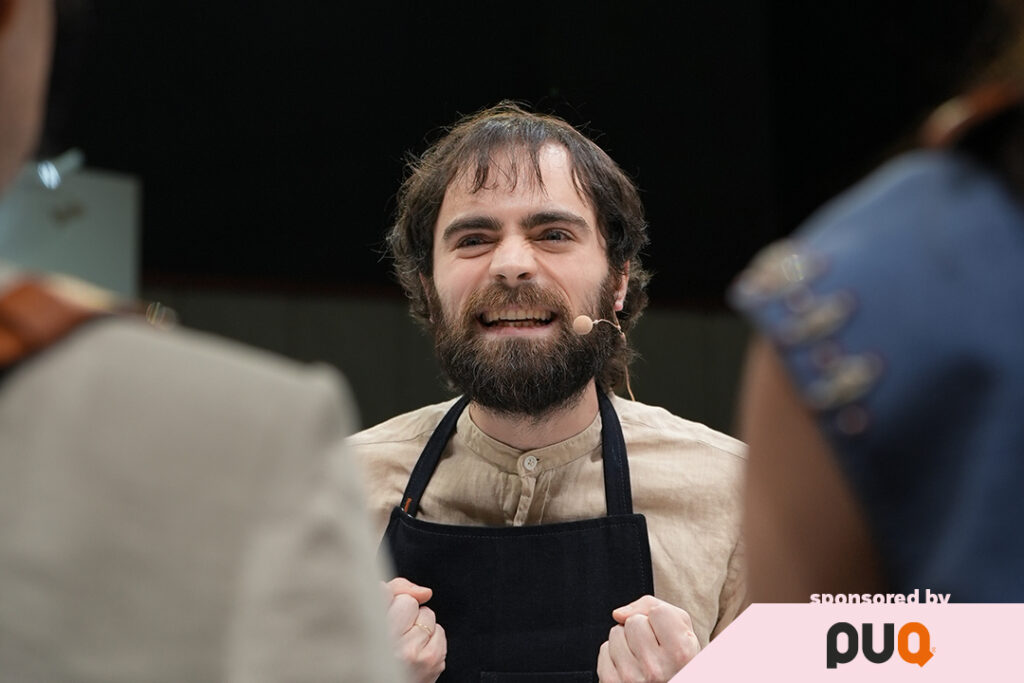
Andrea, what is your first memory with coffee?
My first memory, like many other Italians, I suppose, is related to the smell of the moka pot in the morning at home. Other than this, my first contact with coffee shops is mainly due to croissants: when my parents would go for an espresso, I’d usually take a pastry. I didn’t really like coffee when I was younger.
When I grew up, and I needed plenty of coffee to stay awake during study sessions, I took a French press and made coffee that way. That was my first approach to filter coffee. I started exploring beans and varieties thanks to a coffee shop in Firenze, and my passion really began.
What inspired you to pursue a career in the coffee industry, and how did you get started?
I started drinking coffee during my years in high school, then I went on to take my Bachelor’s degree in Philosophy. After all those years, I noticed that my passion for coffee always stayed with me, and so I thought of making a career out of it. I took some courses and started looking for a job. I just liked the idea of being a barista and learning more and more about coffee and coffee-making.
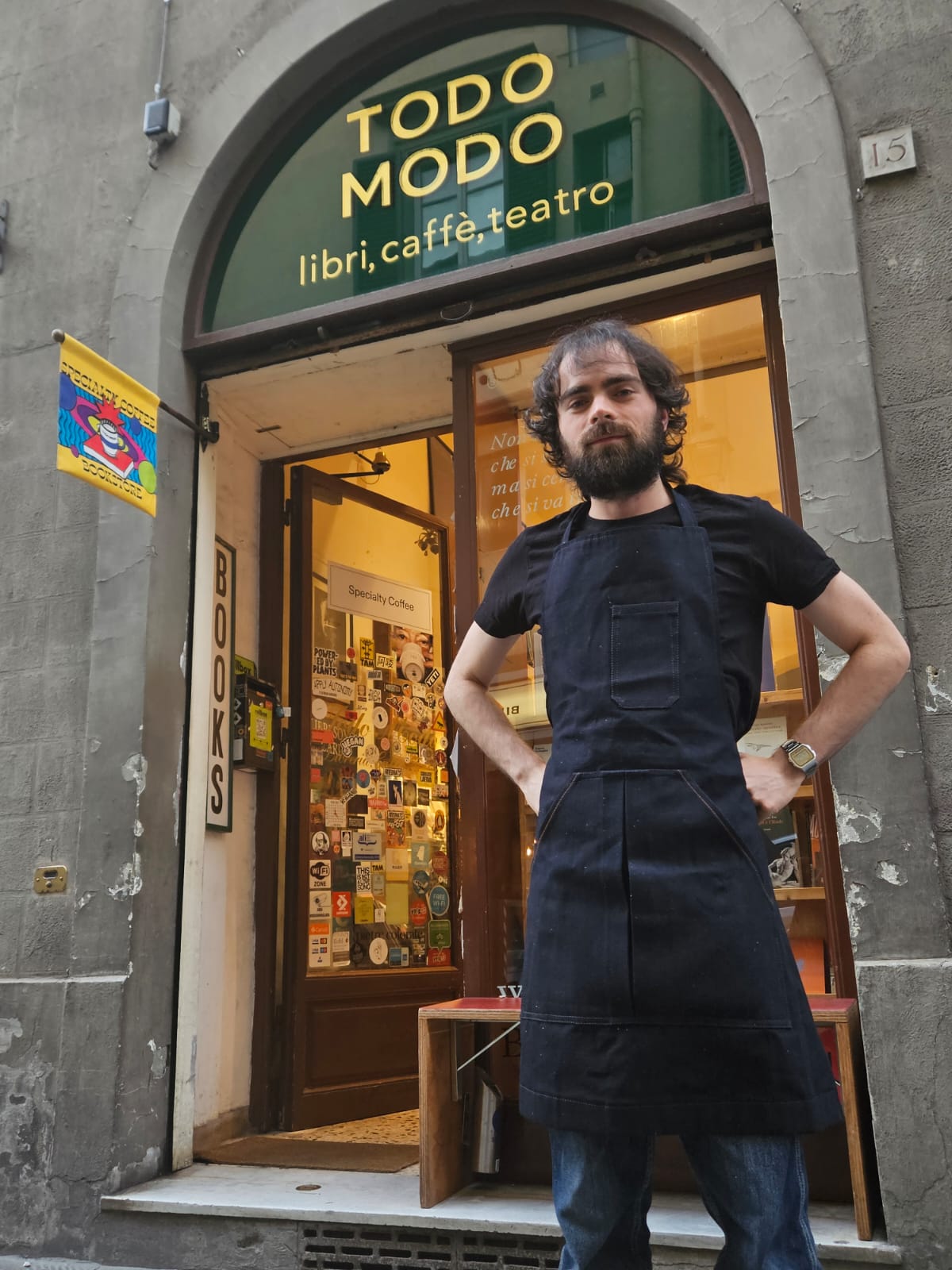
Tell us a bit about the place you work at. What is your role there?
TODOMODO is an Independent Bookshop in the city centre. It also has a coffee shop and bistro inside called Uqbar. TODOMODO switched from commodity to specialty in late April of last year. We did this change together and also with the help of Jessica Sartiani, an amazing coffee professional and my “coffee mentor”, I’d say. Since then, I have overseen anything coffee-related, from taking orders, choosing the menu, bar day-to-day operations, and anything really.
What kind of experience do you want your customers to have when they visit you at the cafe?
My goal is always to make the customers feel welcome and have a nice experience. This can mean many things: some customers just want a quick coffee, others want a detailed explanation of a recipe, and others maybe want to know more about coffee. My goal is to understand the needs of the customers and to give them what they want in the best way possible.
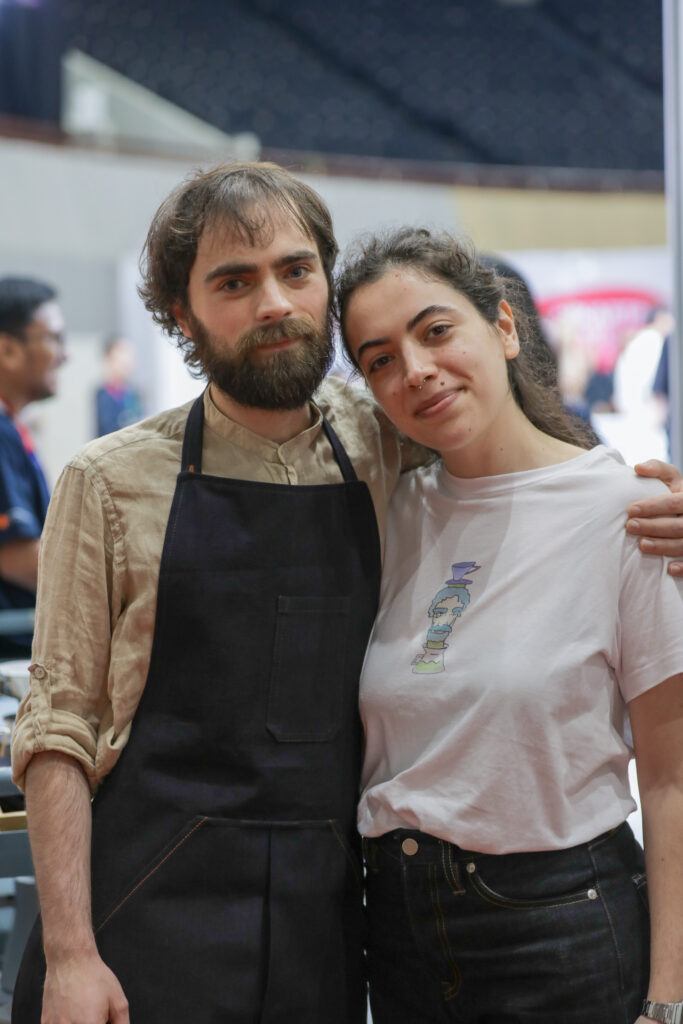
What is your favourite part of the day in your cafe, and why?
I think it is the first part of the morning when I dial in and have some coffee with my colleagues before the shift begins. I like the peace of it, I like that feeling of “beginning the day”, and I like being able to take my time.
How do you stay motivated and inspired to keep improving your coffee skills?
I really like trying new things in coffee: it can be a variety, a recipe, a roaster, or a method. Tasting the cup and seeing what’s different really helps with motivation. But most of all is sharing all of this that keeps me inspired. I really love discussing coffee with friends and most importantly with Caterina, my girlfriend and competition coach.
What are some common misconceptions about our industry that you’ve encountered, and how do you address them?
We really put a lot of importance towards brewing equipment and machines. They are important, of course, but the quality of coffee (as well as water) is what really makes or breaks a cup. When I began, I was all in to get to try new grinders, drippers, filters and that kind of stuff. It’s part of the journey, I guess. Now I try to stress the importance of coffee bean quality to new customers before anything else.
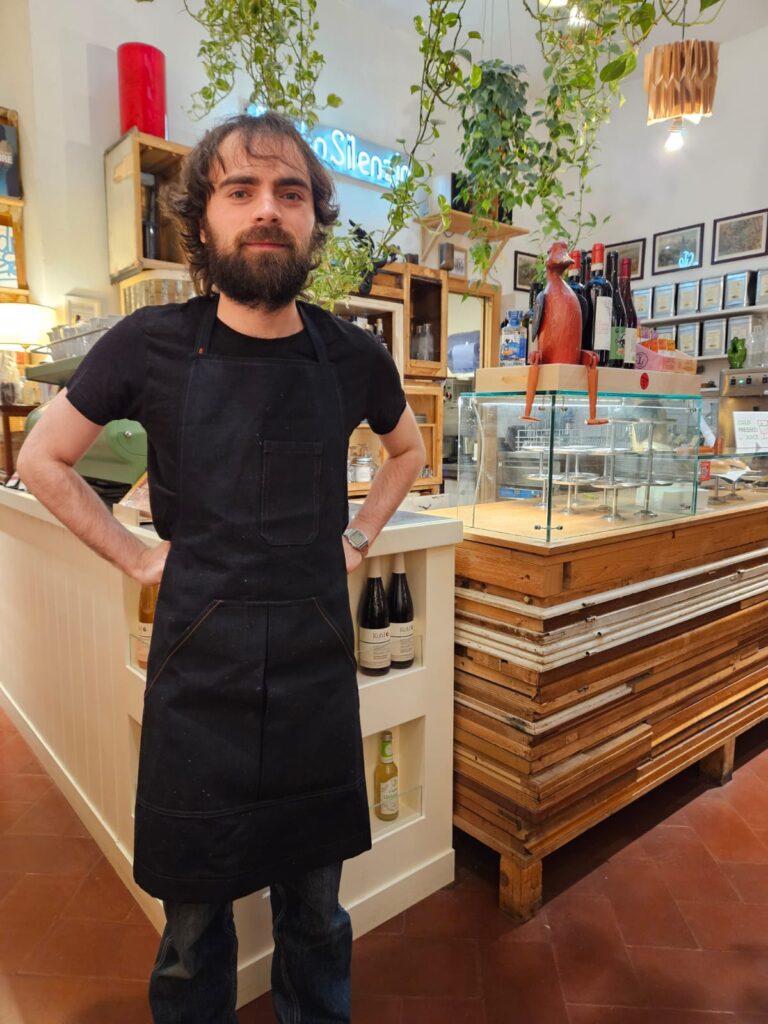
What are the current trends in cafes in your region? Are there any trends you promote yourself and would like to see more often in other places?
Italy is very much rooted in traditional coffee-wise, so even pour-overs can be seen as a novelty. Florence is a very touristy city, so we have kind of a more international scope, but the most ordered items are usually espresso and cappuccino.
What I try to do differently regarding pour-overs is to offer a very tailored cup, asking the customers’ preferences in terms of strength, balance and flavour, so that you can choose not only the beans but even the cup profile in that sense. Of course, many people let me choose for them, but it’s something I enjoy doing because, in that way, my tasks feel less mechanical.
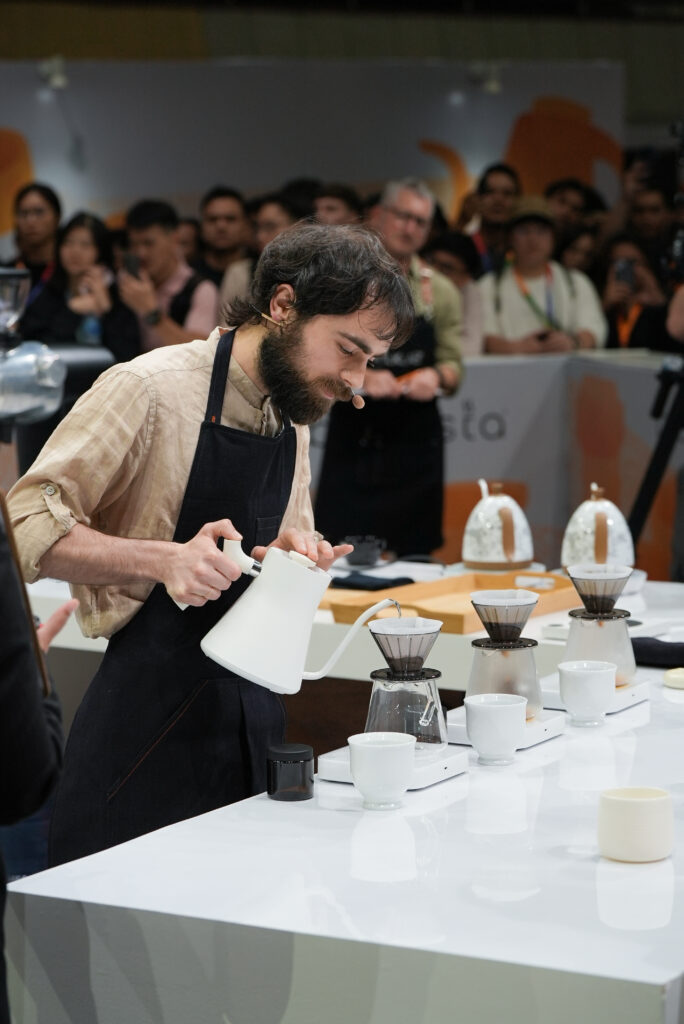
You have some amazing achievements in championships. Can you tell us more about them?
I started competing back in 2021 in the Italian Aeropress Championship. I liked the stage and I wanted to put my skills to the test. Managing to get 2nd place was a huge achievement for me when I was just beginning professionally in coffee. The next year I tried the Brewers Cup and got 4th, the year after 3rd, and this year 1st as well as world finalist. I can also answer with an extract from my newsletter:
“Competitions can look intimidating: fancy equipment, strict rules, high-stakes performances. And yes, there’s pressure. For many, it seems like a world reserved for the elite few with time, money, and nerves. But I really want to tell you that the passion that fuels those stages is the same passion you have brewing in your kitchen, your local café, or your favourite roastery. I myself trained at home, in my kitchen, with my partner, coach and flavour-sparring buddy Caterina. We didn’t have a big team or a fancy setup. But we had curiosity. And honestly, that’s what brought us there.
Of course, there’s a deep knowledge behind everything we do, and everything I’ve learned so far is also what brought me here. But I feel that sometimes we all get lost in the details. Focusing on this open mindset, on this curiosity, can really help you keep an eye on the big picture. Specialty coffee isn’t about gatekeeping – it’s about growing. It’s about tasting something new and going, “Whoa, what was that?”
Competitions are a small part of the coffee world, a spotlight on some of the best skills and creativity. But the heart of it? It’s again curiosity, craft, and joy. The same spirit that wakes you up and makes you fiddle with your pour-over or espresso machine. The same spirit that makes you want to wake up just to brew another coffee.
The only difference is the spotlight, and even then, it’s just another way to share what coffee has to tell.”
How did it feel to compete on the World Stage?
It’s been a great experience that I’m very happy to have shared with Caterina. At times it’s been overwhelming, and it was kinda hard to balance work, training and “life”, but in the end it was all worth it. What we really loved was the atmosphere at the event. All the other competitors, as well as past ones that I’ve admired for years, were all there, cheering for one another and sharing coffee. Of course, there was competition as well, but it was so in a very fair way. That sense of community is what stayed with me the most.
What, in your opinion, is the most important thing to have in mind when you start to compete in coffee championships?
That it’s not about the competition itself, not only that. Everything you bring on stage comes from your whole coffee journey – the people you’ve met, the cups you brewed, as well as the mistakes you’ve made. If, at that point, you feel you have something to say, then I’d go for it. Of course, you can also compete to see what your skills are at that point, but to me, in that way, it loses a bit of its appeal.
What are your passions and hobbies apart from coffee?
I like to do a lot of stuff, but I’d say food and cooking are key. I love exploring flavours, cuisines, new dishes and sharing meals. Cooking can also teach you a lot, from many points of view.
If there were one piece of knowledge about coffee you’d like everyone to know, what would that be?
There are no absolute rules. And the best piece of equipment you have is your palate. Before investing in advanced gear, train your palate, cultivate your taste, and your coffee journey will not only be easier, but also much more enjoyable.

Quick Fire Questions for Andrea Batacchi:
Filter coffee or espresso-based?
Filter coffee.
Milk coffee or black coffee?
Black.
The most underrated coffee drink?
Turkish coffee.
The most underrated coffee brewer?
Moka pot.
Which method to make coffee you use at home?
Anything really.
The number one place in Europe that every coffee geek should visit?
Too many great places!
Favourite city outside your own for a coffee tour?
Paris, the level is amazing!

